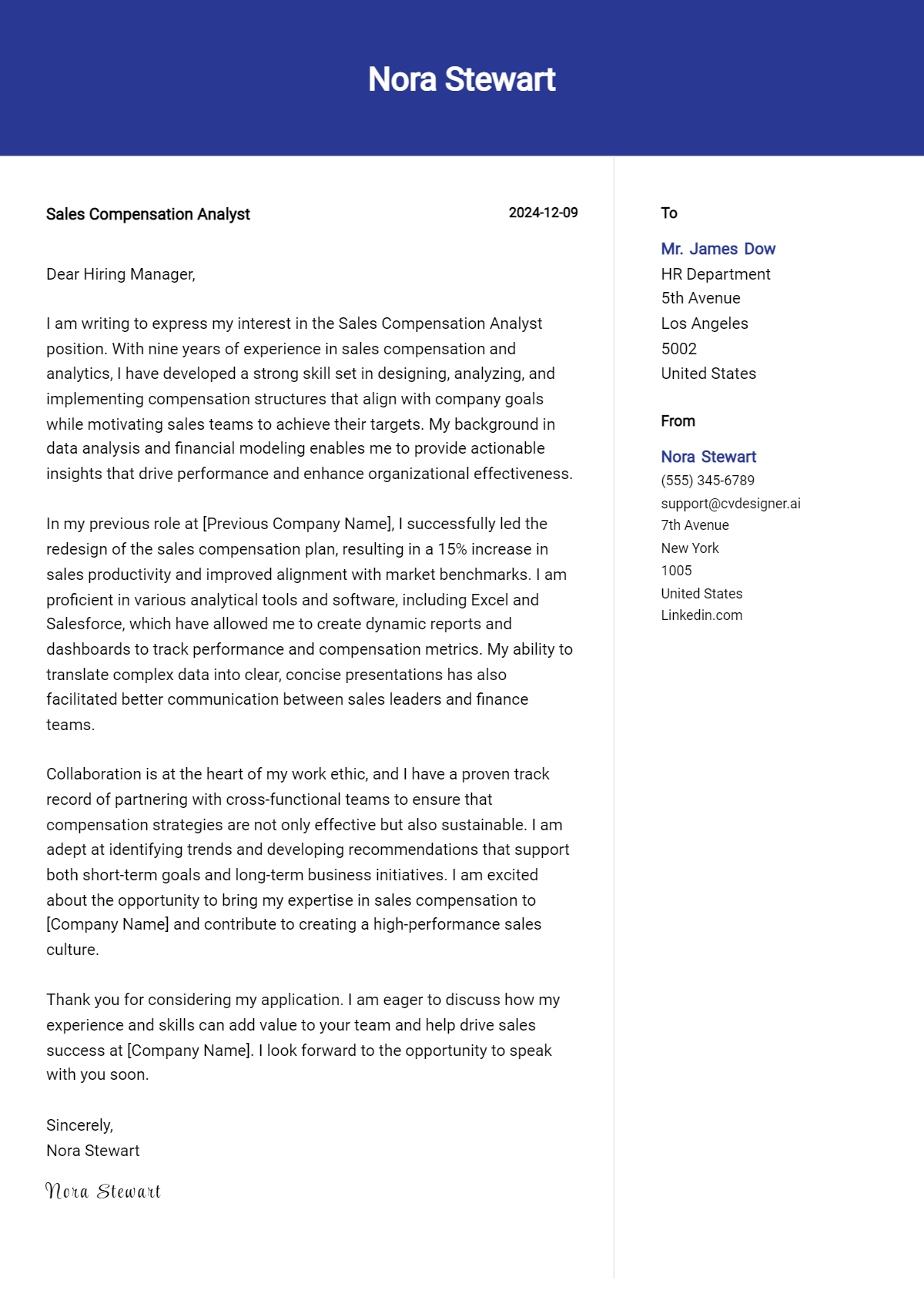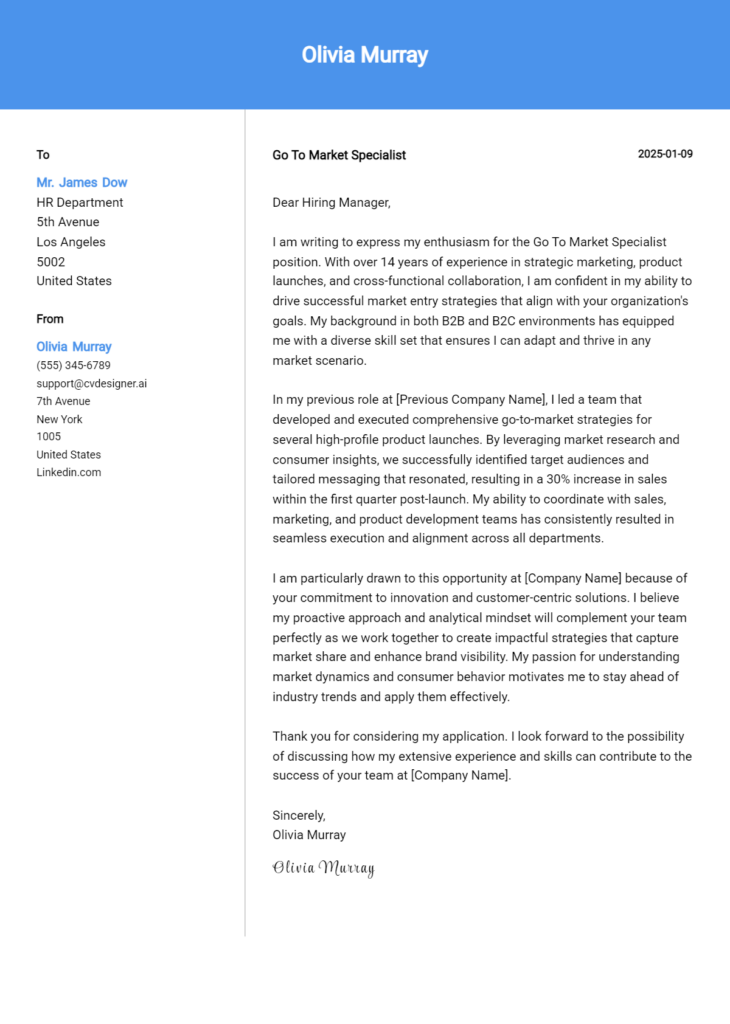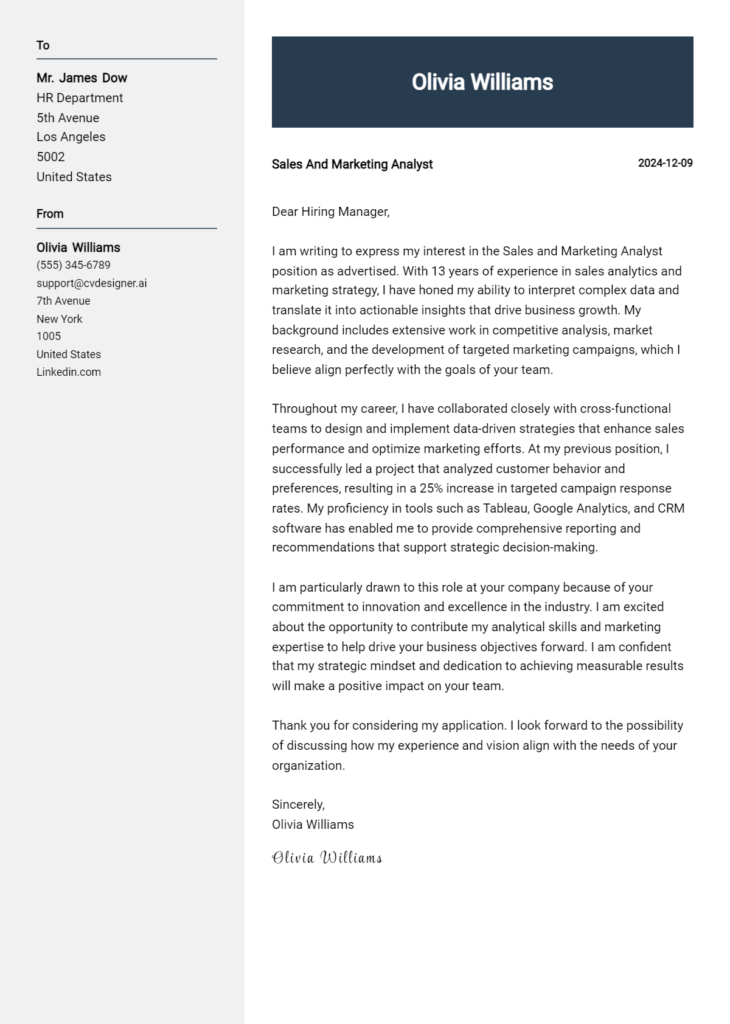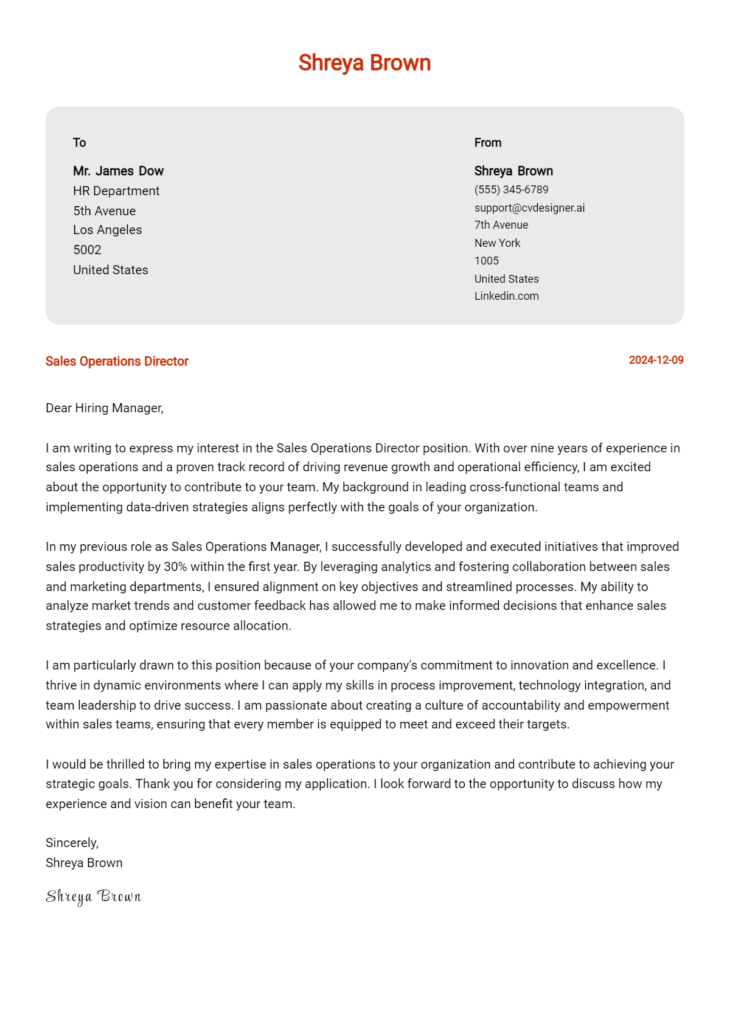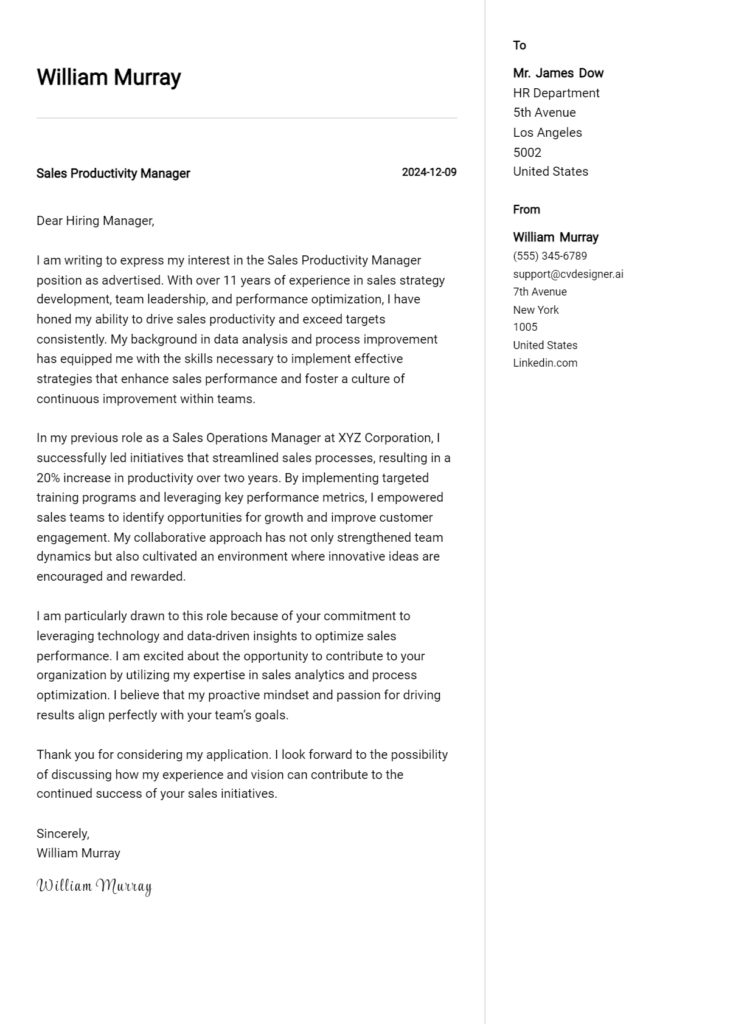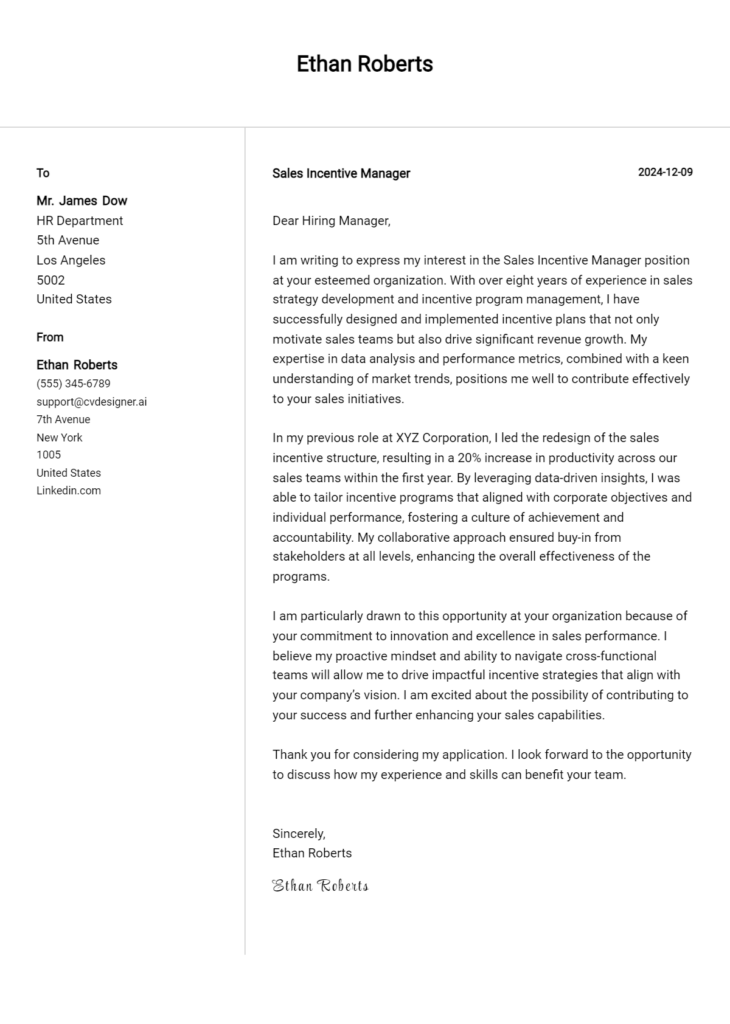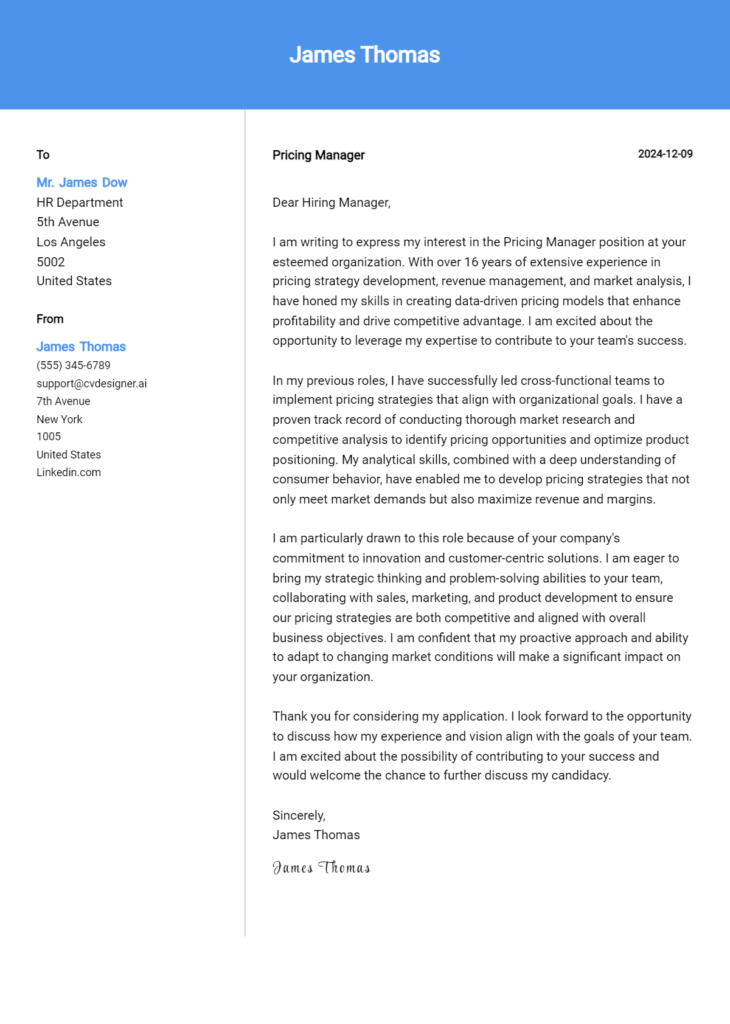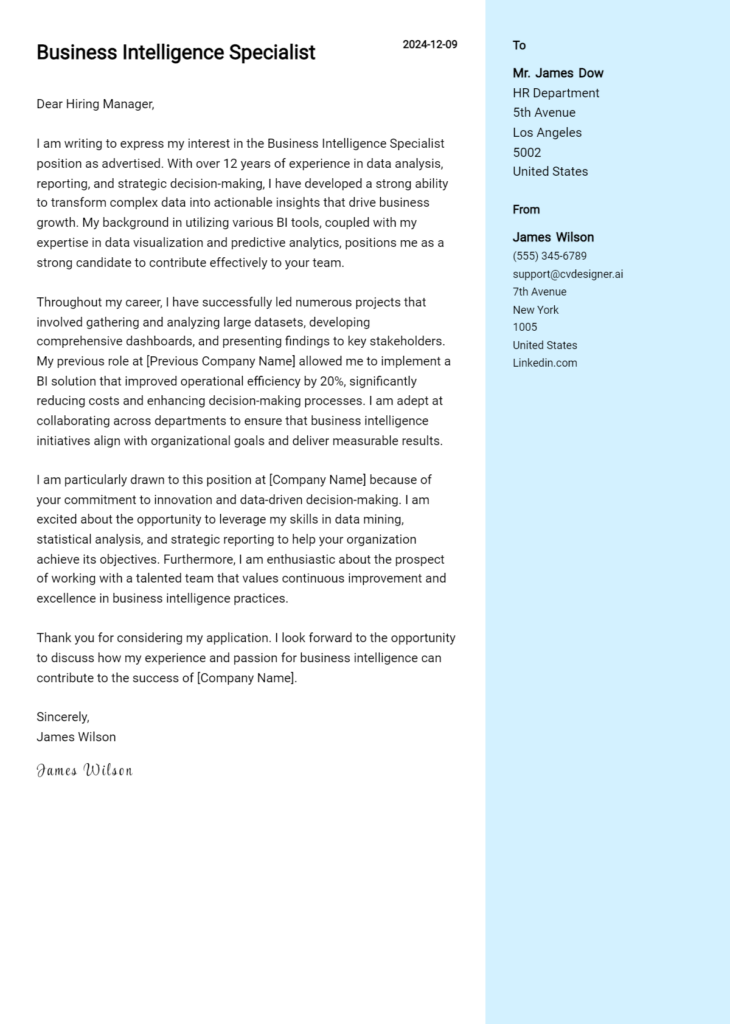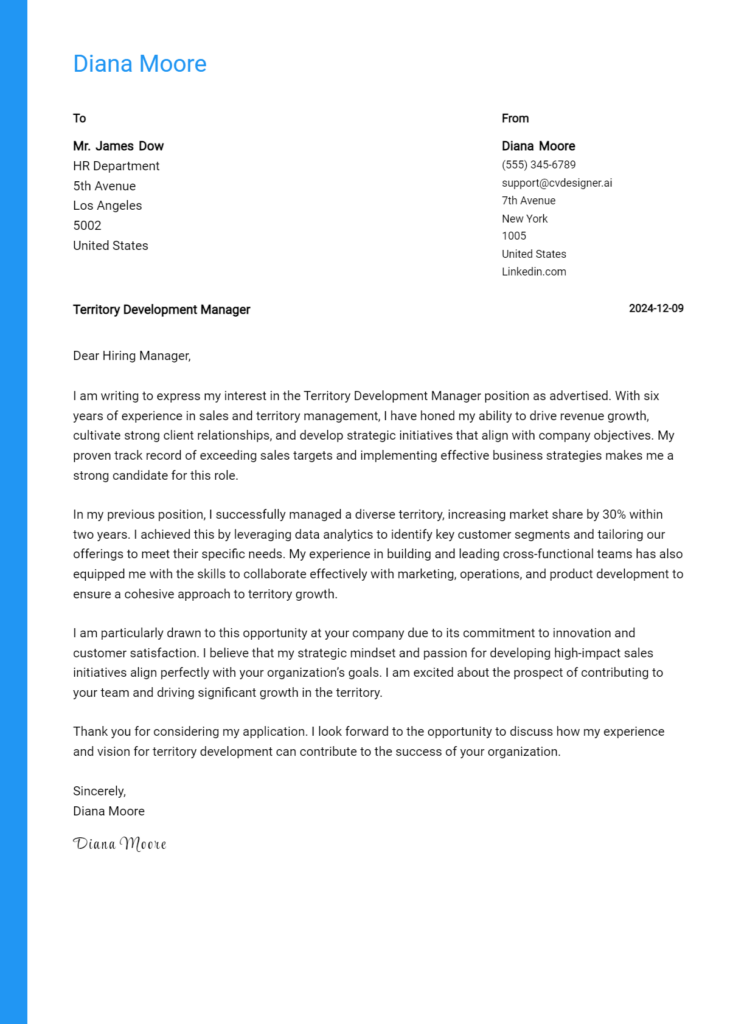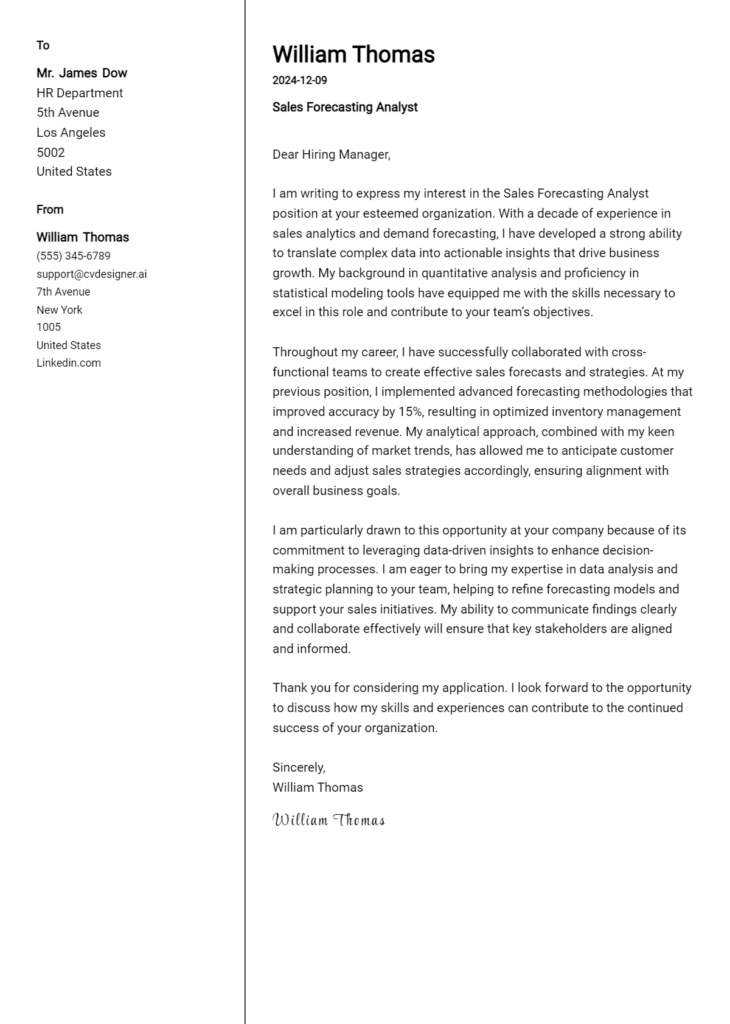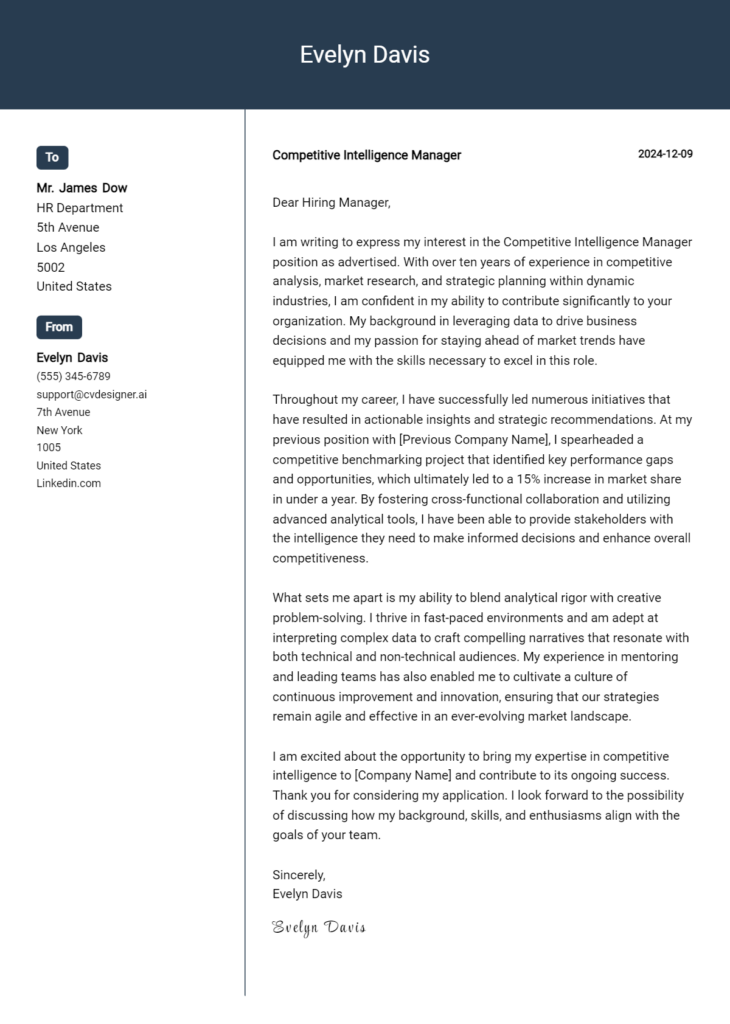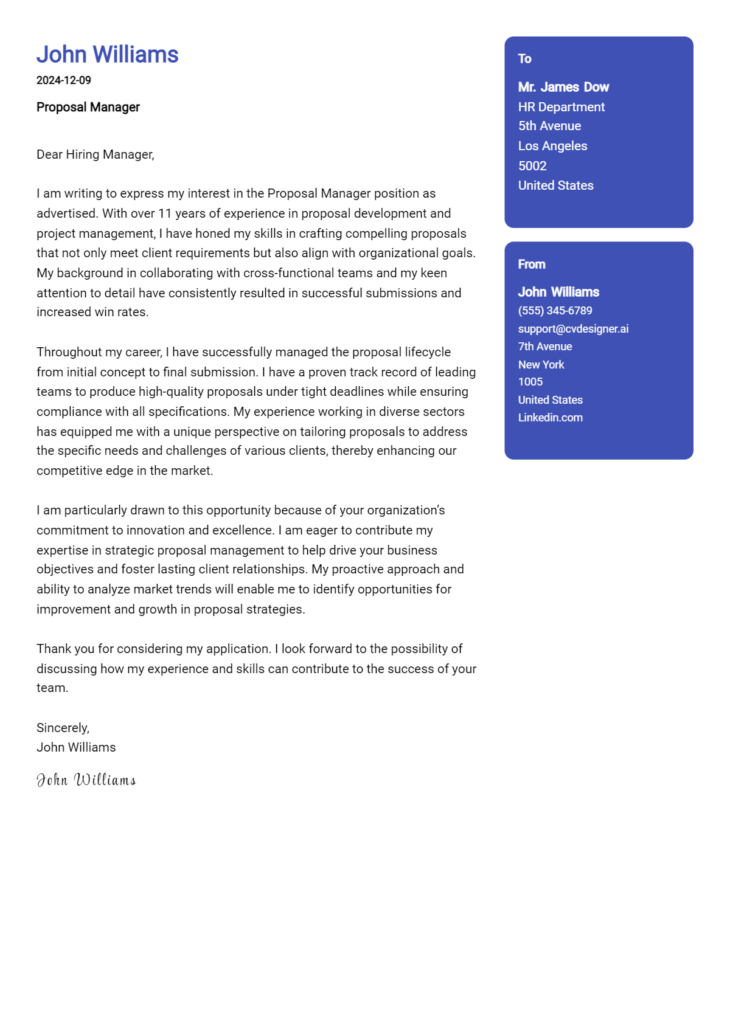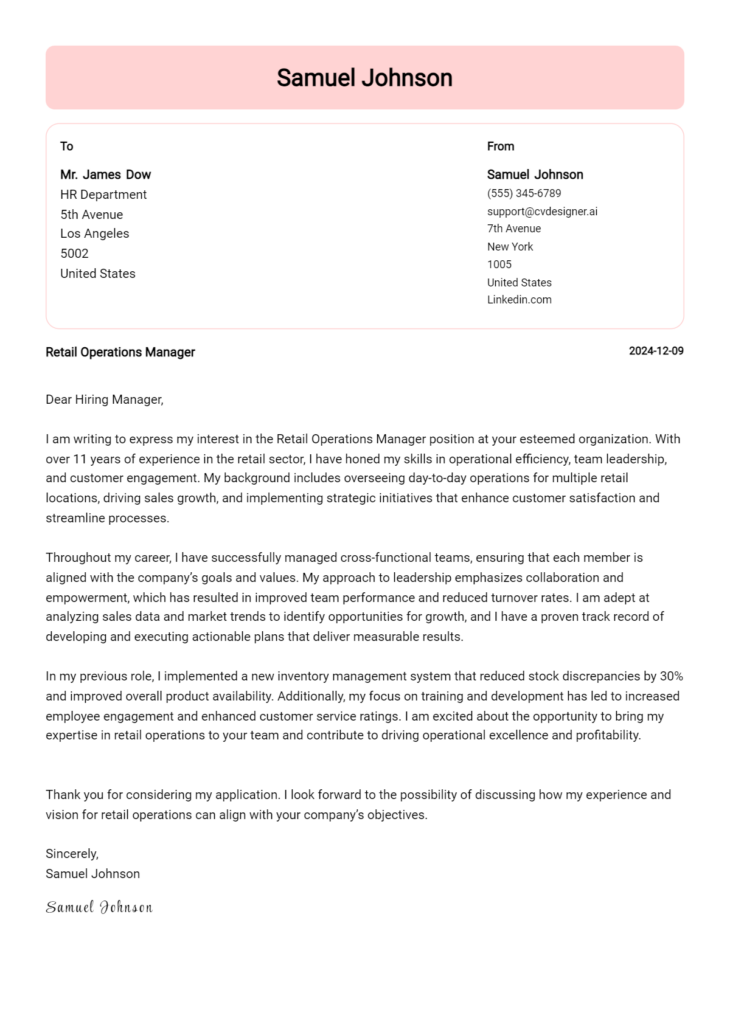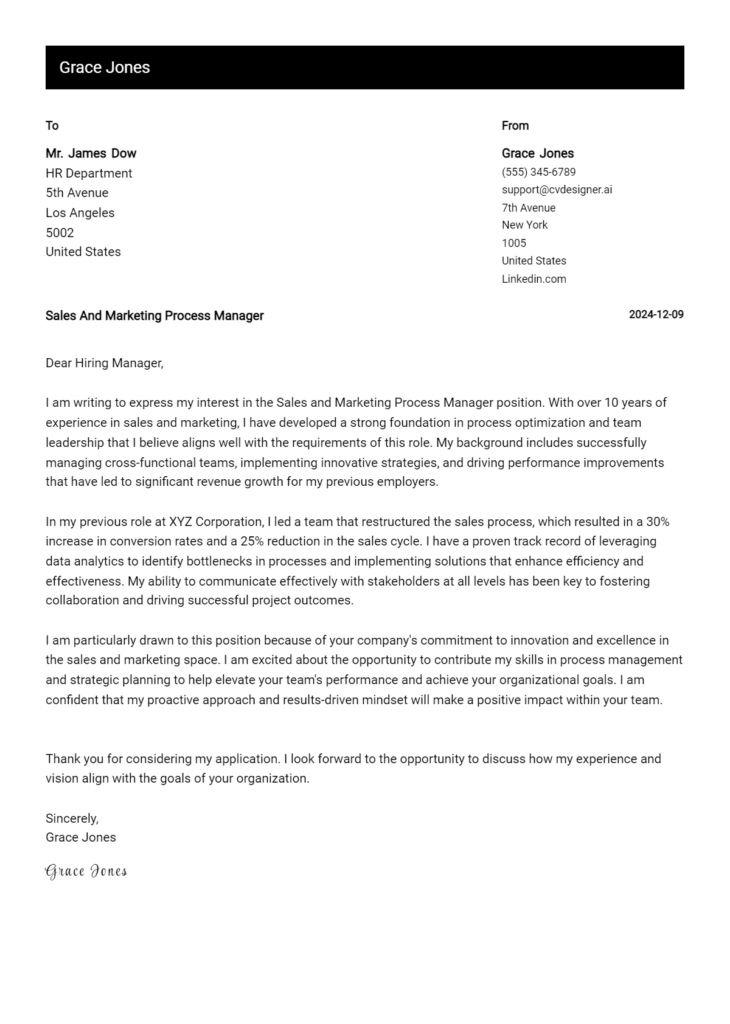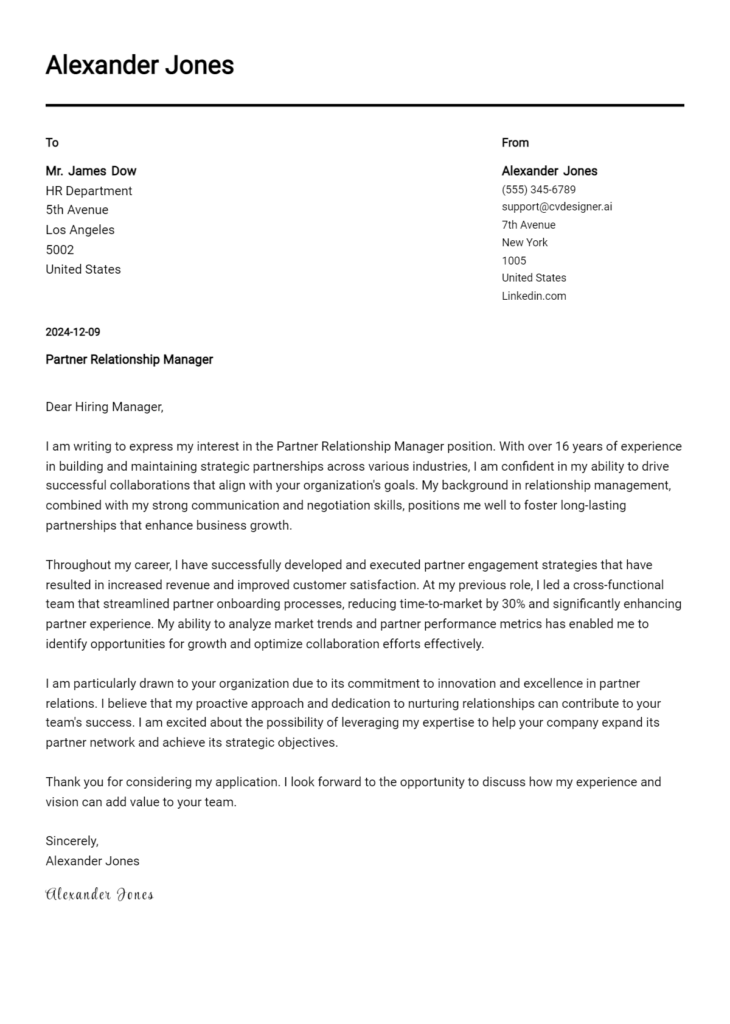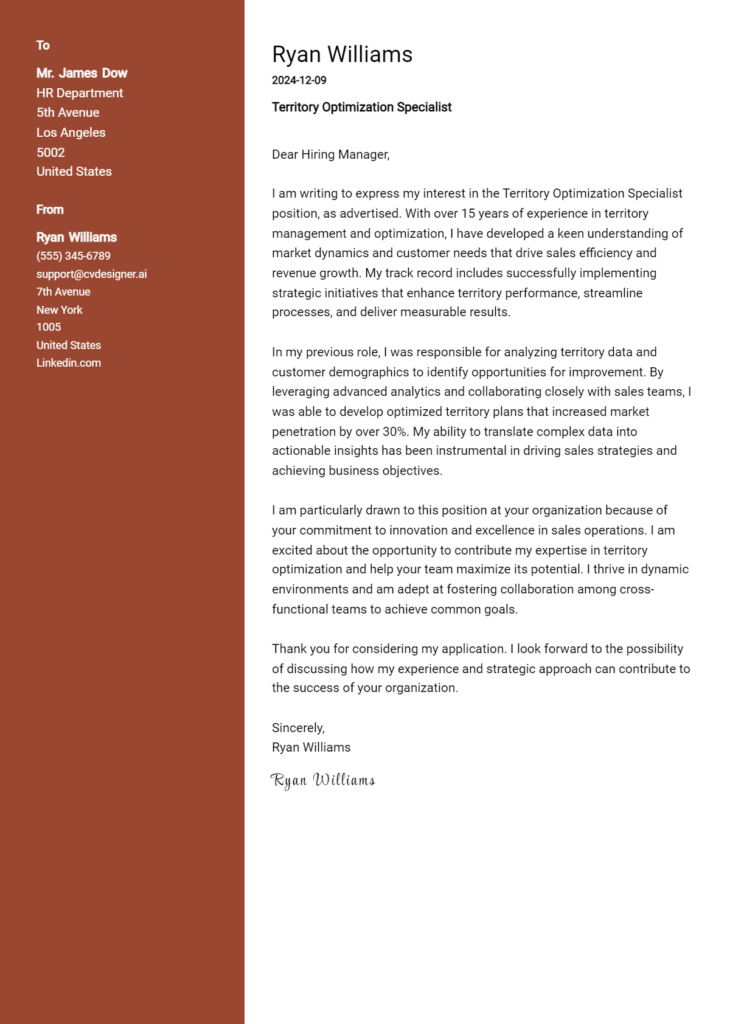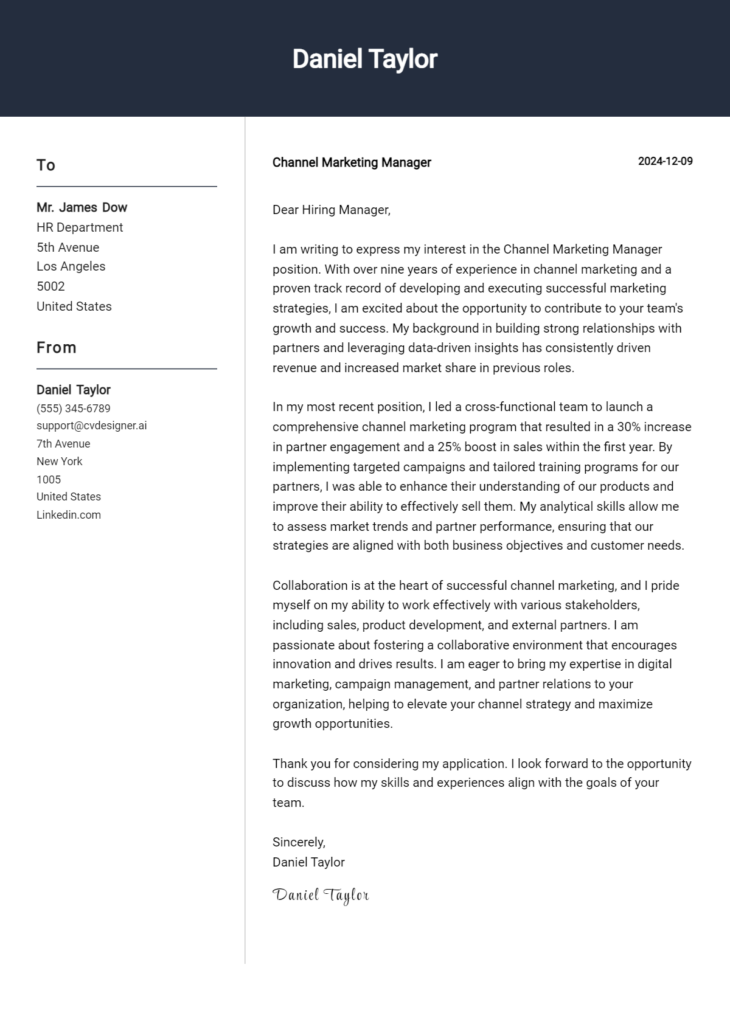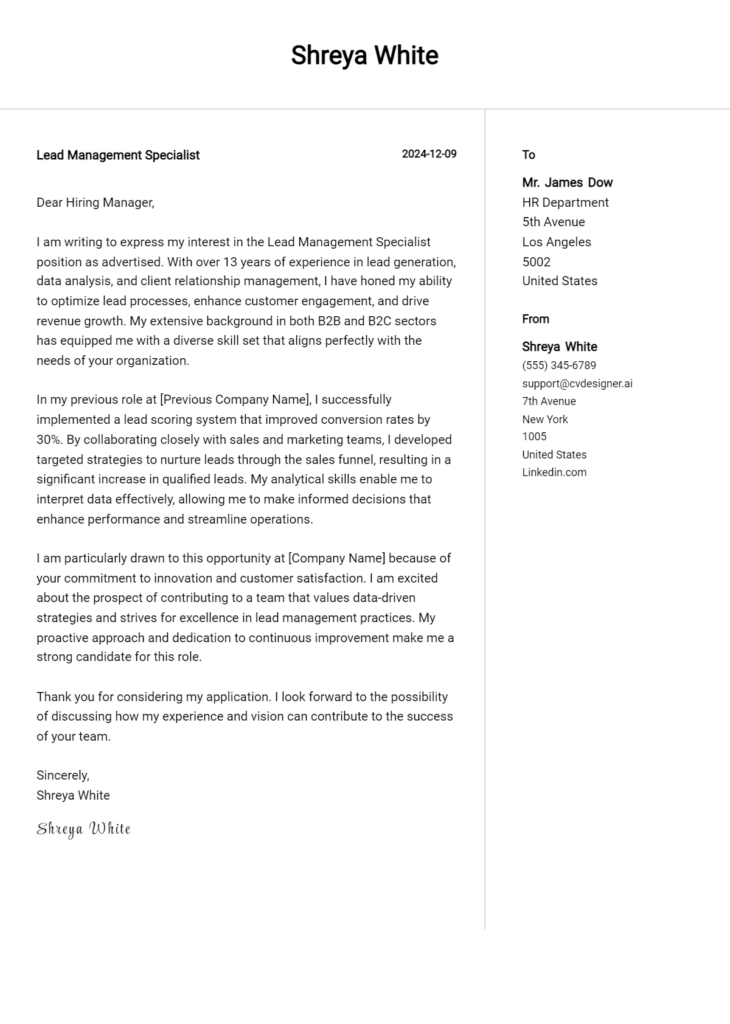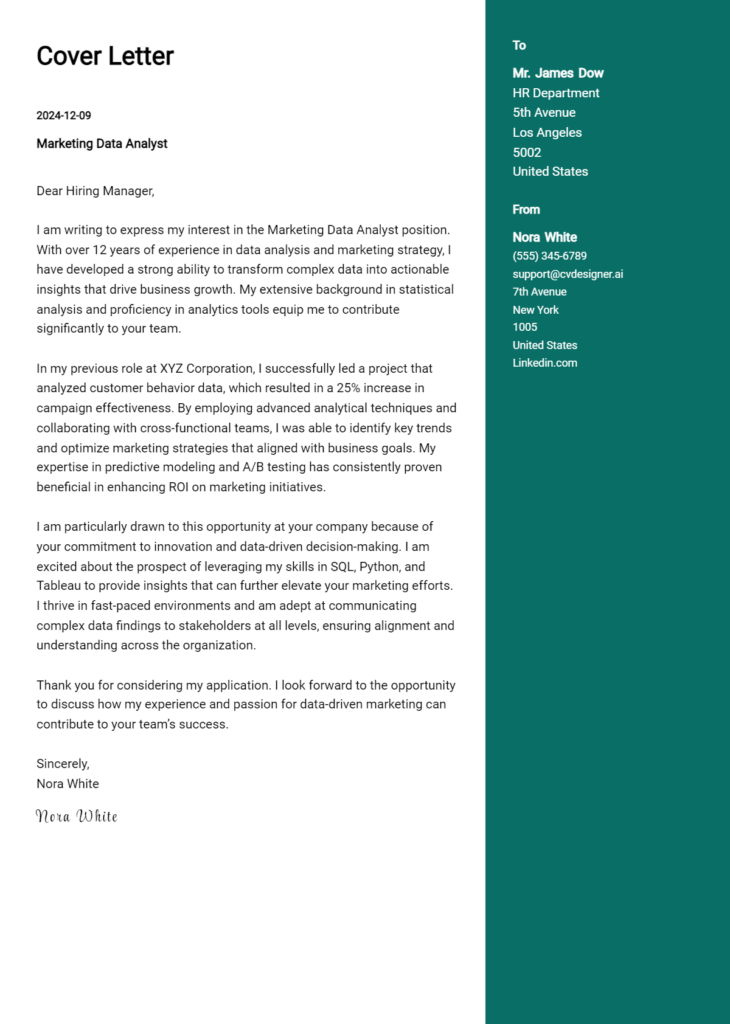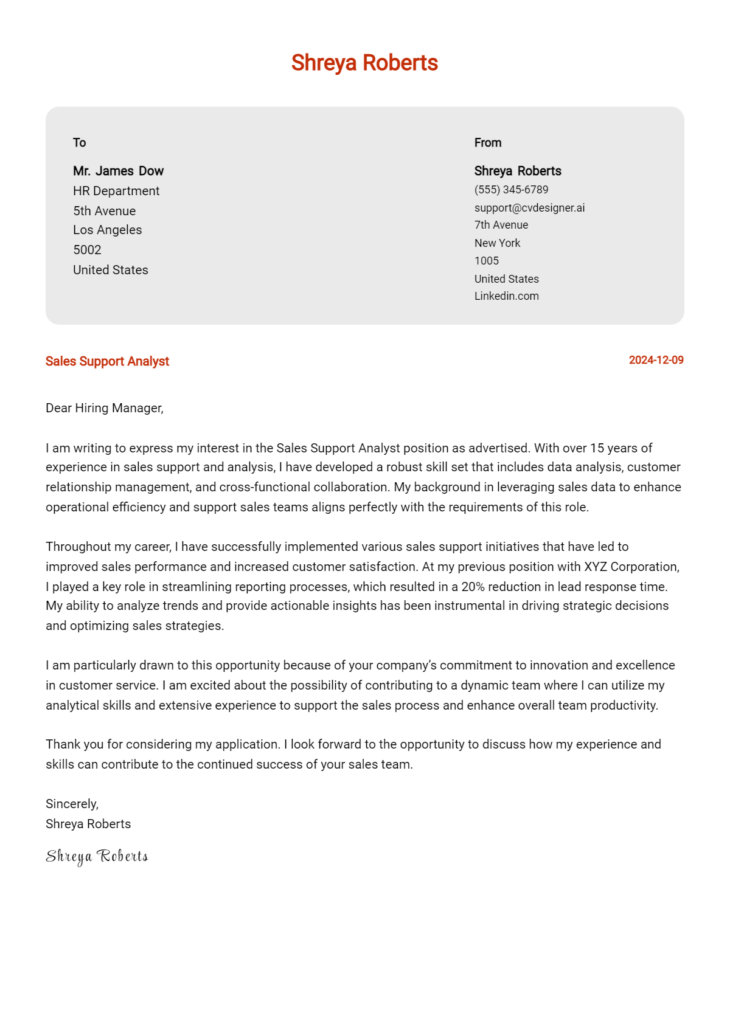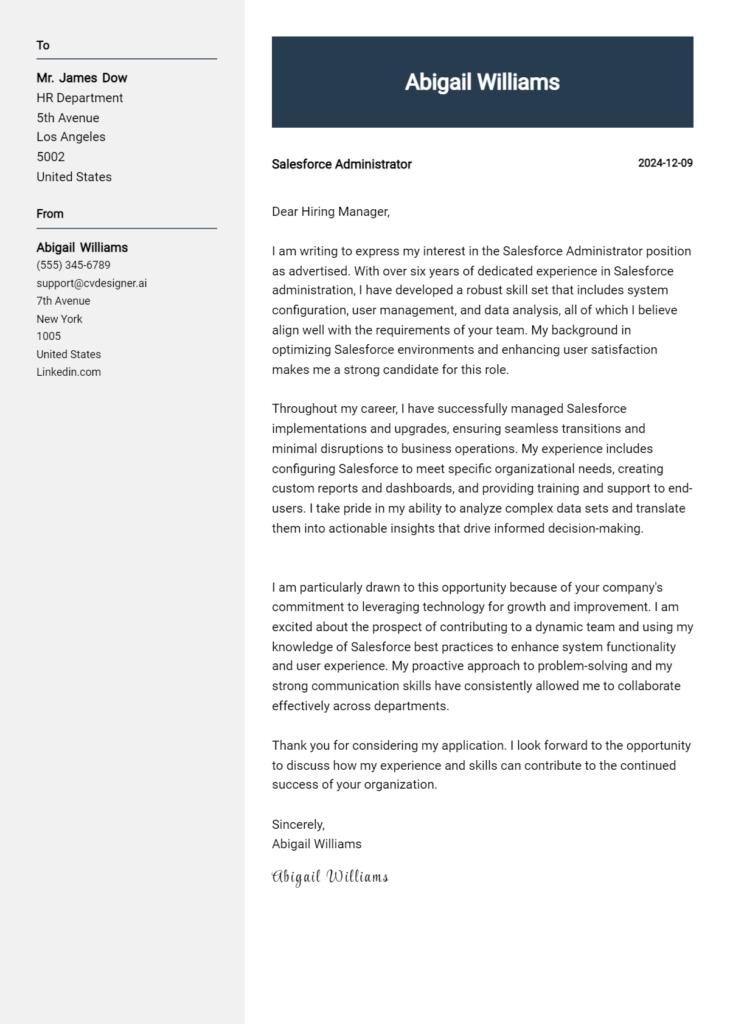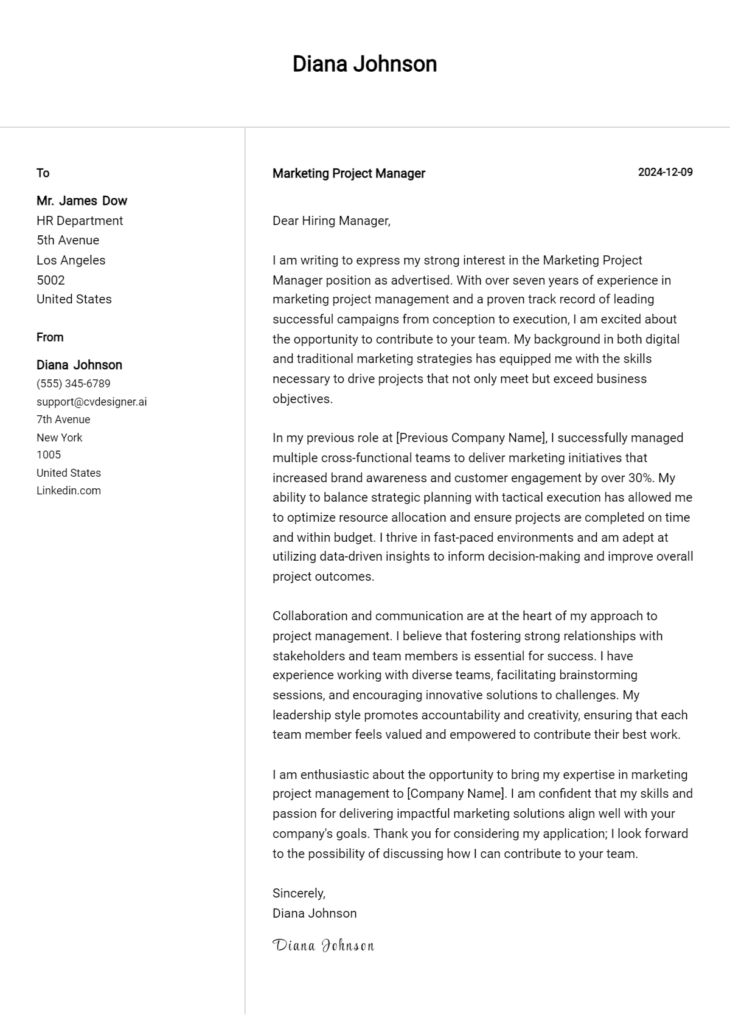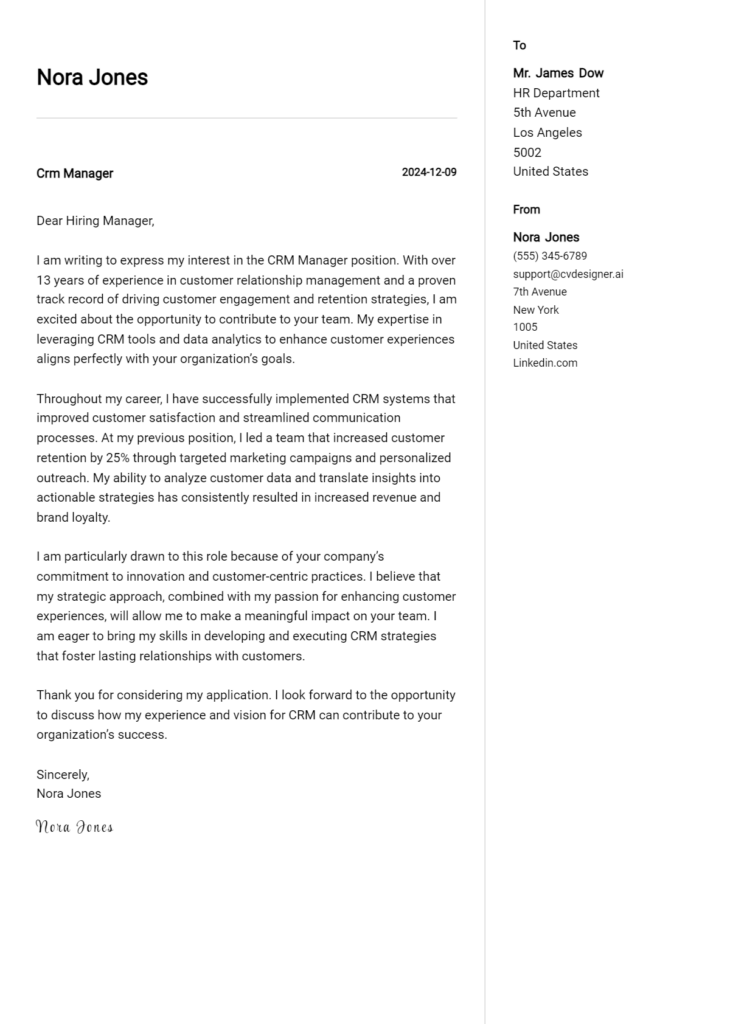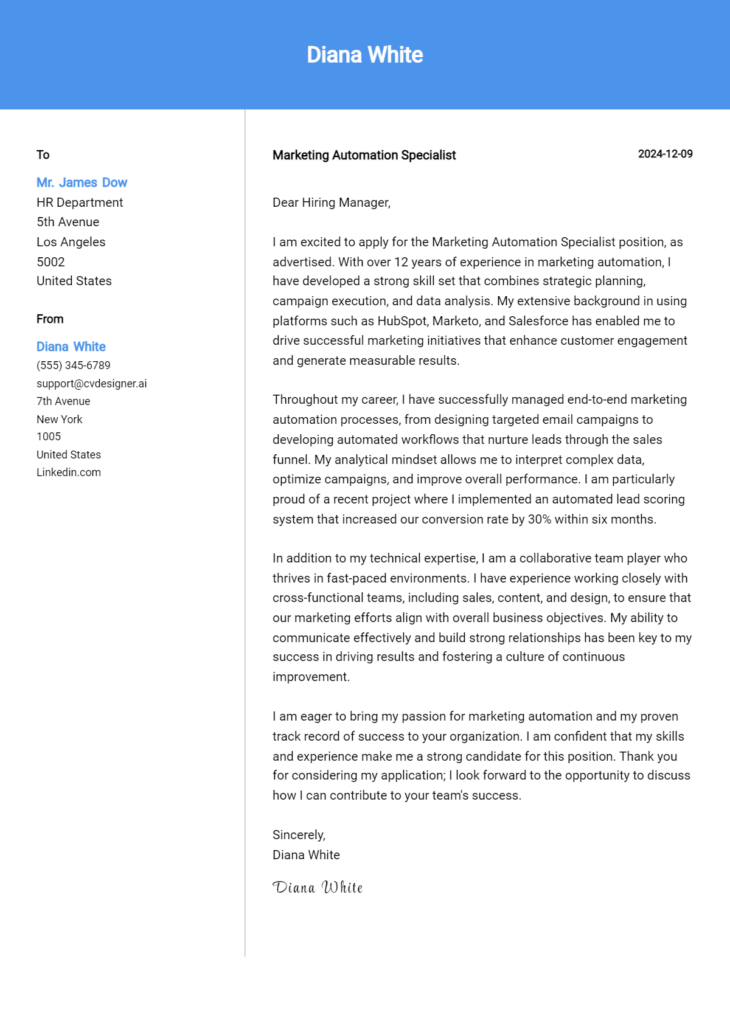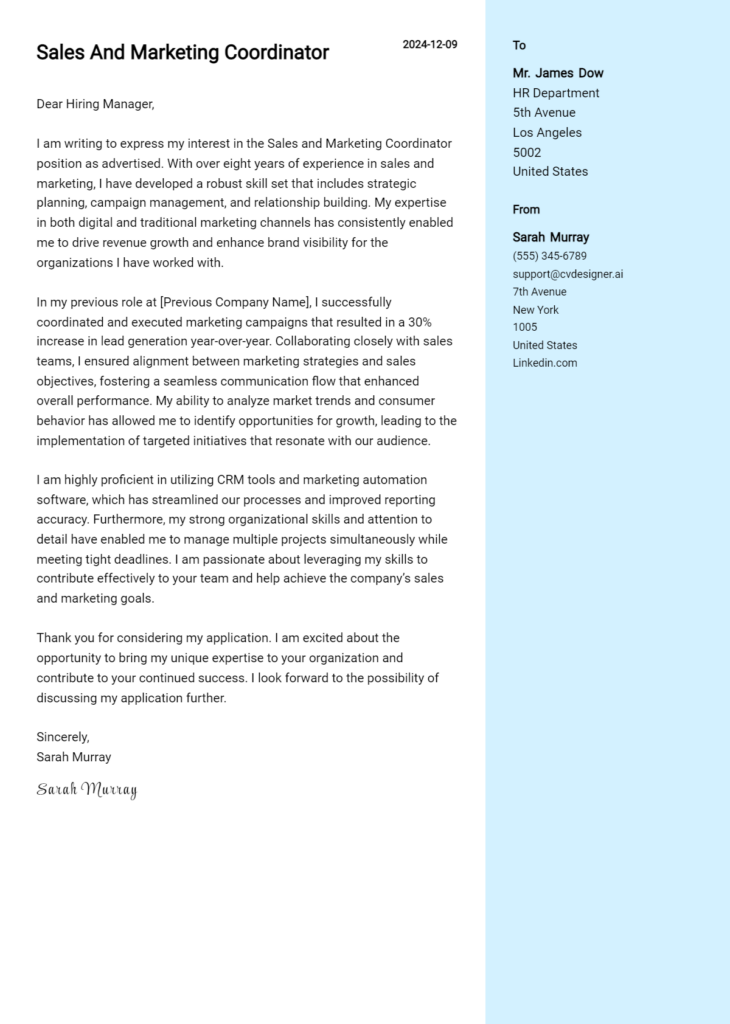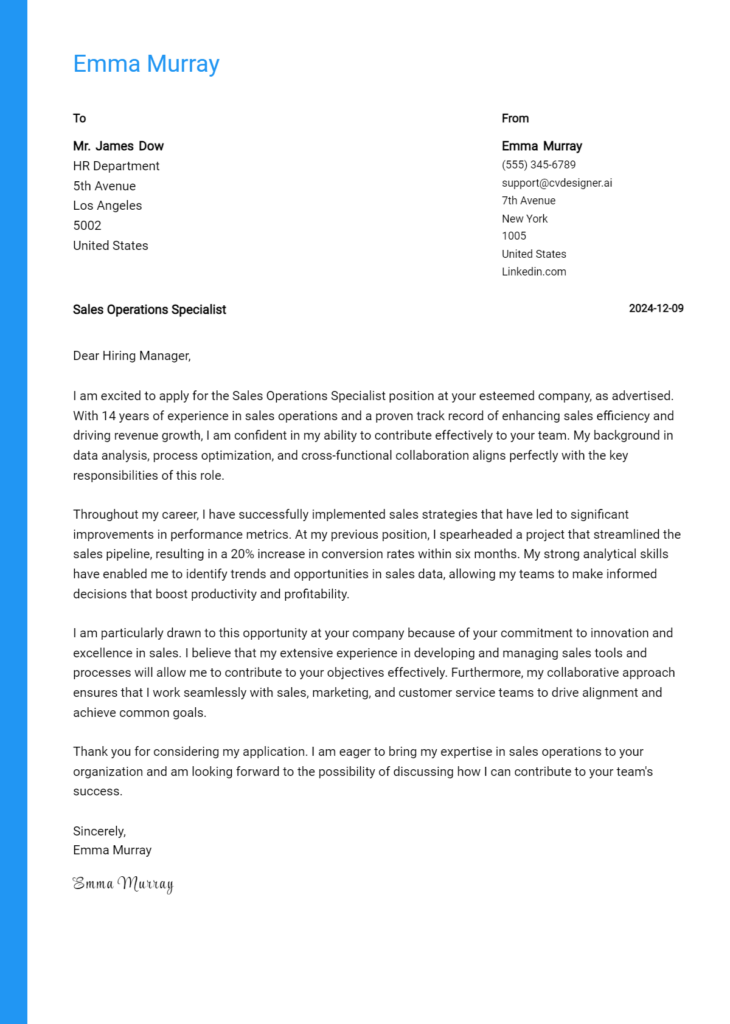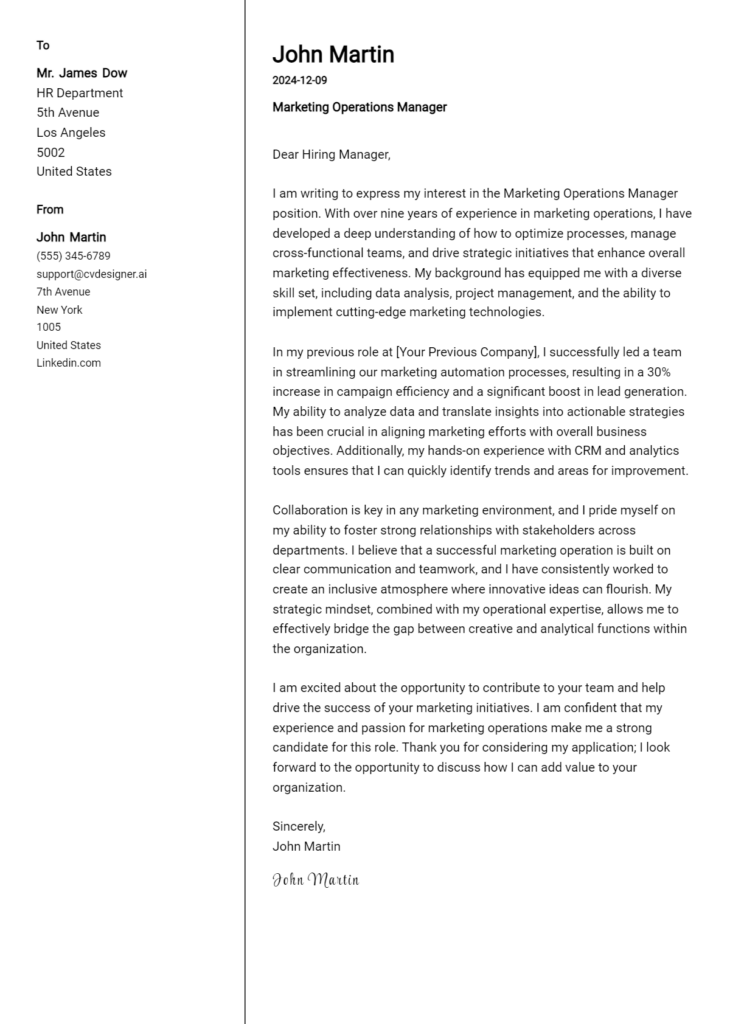Sales Compensation Analyst Cover Letter Examples
Explore additional Sales Compensation Analyst cover letter samples and guides and see what works for your level of experience or role.
How to Format a Sales Compensation Analyst Cover Letter?
Crafting a compelling cover letter is crucial for a Sales Compensation Analyst, as it serves as your first impression on potential employers. The way you format your cover letter not only reflects your professionalism but also demonstrates your analytical skills and attention to detail—key attributes in the field of sales compensation. A well-structured cover letter can effectively highlight your expertise in compensation analysis, data interpretation, and strategic planning, engaging the hiring manager and setting you apart from other candidates.
In this guide, we will discuss how to structure your cover letter, providing specific insights and examples tailored for a Sales Compensation Analyst role.
We’ll focus on the essential components of a professional cover letter, including:
- Cover Letter Header
- Cover Letter Greeting
- Cover Letter Introduction
- Cover Letter Body
- Cover Letter Closing
Each section is integral to showcasing your qualifications and enhancing your appeal as a candidate. Let’s break down each part and explore how to make your cover letter stand out in the competitive job market.
Importance of the Cover Letter Header for a Sales Compensation Analyst
A well-structured cover letter header is crucial for a Sales Compensation Analyst as it sets the tone for the entire document and establishes a professional first impression. The header should include your contact information, the date, and the recipient's details, ensuring that the reader can easily identify who you are and how to reach you. Clarity and professionalism are key, as this reflects your attention to detail and organizational skills—qualities that are essential in a compensation analyst role.
Here are examples of a strong and weak cover letter header:
Strong Example
John Smith 123 Main St. Cityville, ST 12345 john.smith@email.com (123) 456-7890 October 10, 2023 Jane Doe Hiring Manager XYZ Corporation 456 Business Rd. Townsville, ST 67890
Weak Example
j.smith@mail.com 10/10/23 XYZ Corp
The Importance of the Cover Letter Greeting
The greeting of your cover letter is more than just a formality; it sets the tone for the entire letter and reflects your professionalism and attention to detail. A well-crafted greeting demonstrates to the hiring manager that you have taken the time to personalize your application, making it clear that you value the opportunity to join their organization. Addressing the hiring manager directly not only establishes a connection but also shows that you have done your homework by researching the company and its key personnel. To avoid generic greetings that can make your letter feel impersonal, take the time to find out the name of the hiring manager or recruiter. If you cannot find a specific name, consider using a more tailored approach that includes the department or team.
Strong Greeting Example
Dear [Hiring Manager's Name],
Weak Greeting Example
To Whom It May Concern,
The Importance of a Captivating Cover Letter Introduction for a Sales Compensation Analyst
A well-crafted cover letter introduction is crucial for a Sales Compensation Analyst as it serves as the first impression on the hiring manager. In a competitive job market, your introduction should not only capture attention but also express your genuine interest in the role. It should succinctly highlight your relevant skills or achievements that align with the job requirements, setting the tone for the rest of your application. A strong introduction can differentiate you from other candidates and encourage the hiring manager to delve deeper into your qualifications.
Strong Example
Dear [Hiring Manager's Name], I am excited to apply for the Sales Compensation Analyst position at [Company Name], as I am passionate about optimizing sales performance through data-driven compensation strategies. With over five years of experience in compensation analysis and a proven track record of increasing sales productivity by 15% through strategic incentive design, I am eager to bring my expertise to your esteemed team. My analytical skills and attention to detail ensure that I can provide valuable insights that align with [Company Name]'s goals.
Weak Example
Dear [Hiring Manager's Name], I am writing to apply for the Sales Compensation Analyst position at [Company Name]. I believe I would be a good fit for this role. I have some experience in sales and compensation, and I think I can help your team.
Purpose of the Cover Letter Body for a Sales Compensation Analyst
The cover letter body for a Sales Compensation Analyst serves a crucial role in demonstrating the candidate's relevant skills, experiences, and overall value to the company. It is an opportunity to go beyond the resume by providing specific examples of past projects or accomplishments that align with the needs of the organization. A strong cover letter body will highlight the candidate's analytical abilities, familiarity with compensation structures, and success in implementing strategies that drive sales performance. This personal narrative not only showcases the candidate's qualifications but also illustrates how they can contribute to the company's objectives and enhance its compensation framework.
Strong Example
I successfully led a project to revamp the sales compensation plan for my previous employer, resulting in a 15% increase in sales productivity within the first quarter of implementation. By conducting in-depth analyses of sales performance data and collaborating with cross-functional teams, I identified key performance indicators that directly aligned compensation with our strategic goals. This initiative not only motivated the sales team but also streamlined our budgeting process, saving the company approximately $200,000 annually. My ability to leverage data analytics and foster collaboration across departments positions me as a valuable asset for your team.
Weak Example
I have some experience in sales compensation analysis and I worked on a few projects in my last job. I think I can help your company with compensation plans. I am good with numbers and enjoy working with spreadsheets. I believe I would be a good fit for this role because I want to learn more about sales compensation.
Importance of the Cover Letter Closing for a Sales Compensation Analyst
The closing paragraph of a cover letter is crucial for a Sales Compensation Analyst as it serves to summarize the applicant's qualifications, reiterate enthusiasm for the role, and encourage the hiring manager to take the next steps, such as reviewing the resume or scheduling an interview. A strong closing can leave a lasting impression, while a weak one might diminish the impact of the entire letter.
Strong Example
In conclusion, my extensive experience in analyzing sales compensation structures, combined with my passion for driving performance and optimizing compensation strategies, positions me as an ideal candidate for this role. I am excited about the opportunity to contribute to your team and help enhance your sales effectiveness. I look forward to the possibility of discussing my application in greater detail and am eager to bring my skills to your organization. Thank you for considering my application; I hope to hear from you soon to schedule an interview.
Weak Example
To wrap things up, I think I would be okay in this role. You can look at my resume if you want to. Let me know if you want to chat.
Crafting an effective cover letter for a Sales Compensation Analyst position is crucial for standing out in a competitive job market. An impactful cover letter should highlight not only your technical skills and problem-solving abilities but also your understanding of the software development life cycle (SDLC), your experience in teamwork, and your enthusiasm for continuous learning. Below are five detailed tips to help you create a compelling cover letter that showcases these essential qualities.
Tips for Writing a Sales Compensation Analyst Cover Letter
Highlight Technical Skills: Emphasize your proficiency with data analysis tools and software, such as Excel, SQL, or specialized compensation management systems. Provide specific examples of how you have utilized these skills to analyze sales data or improve compensation structures in your previous roles. This will demonstrate your ability to leverage technology effectively in a sales compensation context.
Showcase Problem-Solving Abilities: Include instances where you identified compensation-related issues and successfully implemented solutions. Describe the challenges you faced, the analytical methods you used, and the positive outcomes that resulted from your interventions. This will illustrate your analytical mindset and capability to drive results.
Demonstrate SDLC Knowledge: If you have experience with projects that involved the SDLC, mention your role in these projects. Discuss your understanding of each phase from planning to deployment and how it relates to the development of compensation systems or tools. This knowledge will position you as a candidate who is not only skilled in compensation analysis but also understands the broader context of system implementation.
Emphasize Teamwork: Sales Compensation Analysts often work closely with sales teams, HR, and finance departments. Highlight your collaborative experiences, detailing how you have worked alongside various stakeholders to develop or revise compensation plans. Mention any specific projects where teamwork led to improved processes or outcomes, showcasing your interpersonal skills and ability to work within a team.
Express Passion for Continuous Learning: The field of sales compensation is continuously evolving, so demonstrating your commitment to professional development is vital. Mention any relevant courses, certifications, or workshops you have completed or plan to pursue. This not only shows your dedication to staying current in the field but also reflects a growth mindset that employers value.
By following these tips and using resources like cover letter templates and a cover letter builder, you can create a tailored and impactful cover letter that will set you apart as a strong candidate for a Sales Compensation Analyst role.
Common Mistakes to Avoid in a Sales Compensation Analyst Cover Letter
Avoiding common mistakes in your cover letter is crucial for standing out as a Sales Compensation Analyst candidate. A well-crafted cover letter can be your ticket to an interview, while a poorly written one can lead to rejection. Here are some frequent pitfalls to watch out for:
Generic Content: Avoid using a one-size-fits-all approach. Tailor your cover letter to the specific job by mentioning the company and role directly. This shows genuine interest and effort.
Neglecting Format: A cluttered or unprofessional layout can distract from your message. Ensure you follow a clear cover letter format that enhances readability.
Lack of Quantifiable Achievements: Failing to include specific accomplishments can make your experience seem vague. Use metrics to highlight your success, such as improved sales performance or reduced compensation discrepancies.
Repetition of the Resume: Your cover letter should complement your resume, not repeat it. Focus on your skills and experiences that are particularly relevant to the Sales Compensation Analyst role.
Overly Formal Language: While professionalism is key, overly stiff language can alienate the reader. Aim for a conversational tone that reflects your personality while remaining professional.
Ignoring Company Culture: Failing to align your cover letter with the company’s culture can be detrimental. Research the company’s values and incorporate them into your narrative to show you’d be a good fit.
Spelling and Grammar Errors: Typos can undermine your credibility. Always proofread your cover letter multiple times and consider using tools or a second pair of eyes to catch mistakes.
By steering clear of these common mistakes, you can create a compelling cover letter that enhances your chances of landing an interview. For more insights and examples, check out cover letter examples.
Cover Letter FAQs for Sales Compensation Analyst
What should I highlight in my cover letter for a Sales Compensation Analyst position?
In your cover letter, emphasize your analytical skills, attention to detail, and understanding of compensation structures. Mention any experience you have with data analysis tools and software, as well as your ability to interpret complex data sets. Highlight your knowledge of sales compensation plans and how they align with business objectives. Additionally, discuss your collaboration skills, as you will often work with sales teams, HR, and finance departments. Including specific examples of past achievements or projects can also demonstrate your capability and suitability for the role.
How can I tailor my cover letter for a specific company?
To tailor your cover letter, research the company’s values, culture, and compensation philosophy. Mention any specific challenges the company may be facing in terms of sales compensation and how your skills can help address those challenges. Use keywords from the job description to ensure your cover letter aligns with the role's requirements. If the company emphasizes innovation in sales strategies, discuss how your analytical approach has led to innovative compensation solutions in your previous roles. Personalizing your letter shows genuine interest and understanding of the company's needs.
Is it important to include metrics in my cover letter?
Yes, including metrics in your cover letter can significantly strengthen your application. Metrics provide concrete evidence of your accomplishments and demonstrate the impact of your work. For example, you might mention how you improved the efficiency of compensation calculations by a certain percentage or how your analysis led to a specific increase in sales performance. Quantifying your achievements makes your contributions more tangible to potential employers and showcases your ability to drive results. Be sure to highlight metrics that are relevant to the sales compensation function.
How do I convey my analytical skills effectively in my cover letter?
To convey your analytical skills effectively, provide specific examples of your past experiences that required strong analytical thinking. Describe situations where you successfully analyzed compensation data, identified trends, and made recommendations that improved sales performance or compensation structures. Use action verbs to demonstrate your involvement and impact. You might say, "Analyzed compensation data for over 200 sales representatives, leading to a 15% increase in sales productivity." Additionally, mention any relevant software or tools you used, such as Excel, SQL, or compensation management systems, to further illustrate your technical proficiency.
Build your Cover Letter in minutes
Use an AI-powered cover letter builder and have your letter done in 5 minutes. Just select your template and our software will guide you through the process.

